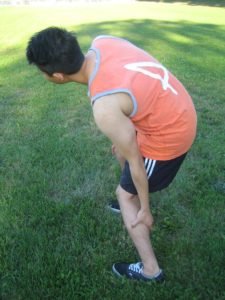Tight Calf Muscles: Overuse Injury Awareness and Prevention
Tight calf muscles are a common issue, particularly among runners, athletes, and individuals whose work involves prolonged standing or repetitive lower-leg movement. The calf muscle group is made up of two primary muscles—the gastrocnemius and the soleus—both of which play an important role in walking, running, and balance.
When these muscles become tight, they can affect performance, increase discomfort, and raise the risk of strain or injury.
Common Signs and Symptoms

Tight calf muscles often develop gradually rather than suddenly. Common signs include:
- A feeling of stiffness or tightness in the lower leg
- Tightness that worsens at the start of activity
- Temporary improvement during movement, followed by stiffness afterward
- Reduced flexibility in the ankle or lower leg
- Discomfort after running, walking, or standing for long periods
Symptoms may be mild at first but can progress if underlying causes are not addressed.
Why Calf Muscles Become Tight
Several factors can contribute to tight calf muscles, including:
- Overuse or repetitive activity, such as running or jumping
- Limited stretching before or after activity
- Muscle fatigue or minor muscle strain
- Poor footwear or worn-out shoes
- Biomechanical factors, such as walking or running patterns that place extra stress on the calves
In some cases, pressure within the muscle compartment can increase during activity, contributing to discomfort and tightness.
Cold weather, which is common in many parts of Canada, can also increase muscle stiffness—especially if activity begins without adequate warm-up.
First Aid and Safety Awareness
From a first aid perspective, recognizing early muscle tightness is important to help prevent more serious injuries such as muscle strains or tendon issues.
General first aid awareness includes:
- Reducing or modifying activities that trigger discomfort
- Allowing adequate rest between high-impact activities
- Using cold or warm applications as appropriate for comfort
- Monitoring symptoms that persist or worsen over time
If tightness interferes with daily activities, work duties, or athletic performance, professional assessment may be recommended.
Injury Prevention and Long-Term Awareness
Maintaining flexibility, strength, and proper movement patterns can reduce the likelihood of recurring calf tightness. Awareness of footwear, training load, and recovery time is especially important for active individuals and workers in physically demanding roles.
First aid training helps individuals recognize early warning signs of musculoskeletal issues and supports safer decisions about activity and escalation.
Educational Disclaimer
This content is for educational purposes only and does not replace professional medical advice. To learn how to recognize and respond to muscle injuries and other physical conditions, consider enrolling in a first aid and CPR course with a Canadian training provider.
